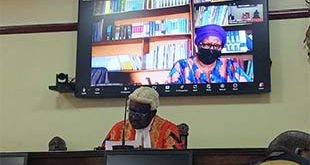
Kampala, Uganda | THE INDEPENDENT | District authorities are faulting the Ministry of Energy and the Uganda National Bureau of Standards-UNBS for permitting the construction of “illegal” pump fuel stations, leading to congestion in urban centers.
These allegations were raised during a sensitization meeting in Mbarara, organized by the Uganda National Bureau of Standards and the Energy Ministry, attended by District Chairpersons, Environment officers, and Police Commanders from the South Western region.
Joseph Mwesigye, the Mbarara District Environment Officer attributed the construction of petrol stations in fragile ecosystems to Ministry officials granting permits without considering input from local and national environment offices. He called for collaboration and joint enforcement of petroleum laws to address these issues.
Deo Atuheire, the Chairperson of Buhweju District, expressed concerns about local government leaders’ limited control over investors who seemingly receive more power from central government agencies, specifically the National Environment Management Authority-NEMA, Ministry of Energy, and UNBS. He noted that some investors obtain the necessary documentation from these agencies before involving local governments, contrary to the expected process.
Edward Nuwamanya, the principal Petroleum officer at the Ministry of Energy and Mineral Development, refuted the accusation, clarifying that local governments approve construction plans for pump fuel stations. The Ministry’s role is to follow the approved plans and enforce standards on stations constructed below specifications. Nuwamanya urged leaders to enforce standards based on petroleum laws.
Peter Kitimbo, the field Fuel Marking Officer, attributed the congestion of petrol stations in urban areas to a lack of standardized policies. He mentioned plans by the Ministry and UNBS to harmonize existing congested areas, emphasizing adherence to standards. As part of the plan, Kitimbo suggested not renewing licenses for petrol stations in congested areas after five years.
Hajj Adam Swaleh, the director of Petro Uganda Mbarara, recommended prioritizing monitoring in rural areas where the number of petrol pumps is increasing. He stressed the importance of providing ample time for petrol pump owners to prepare and relocate if necessary to alleviate congestion in urban centers.
****
URN
 The Independent Uganda: You get the Truth we Pay the Price
The Independent Uganda: You get the Truth we Pay the Price


